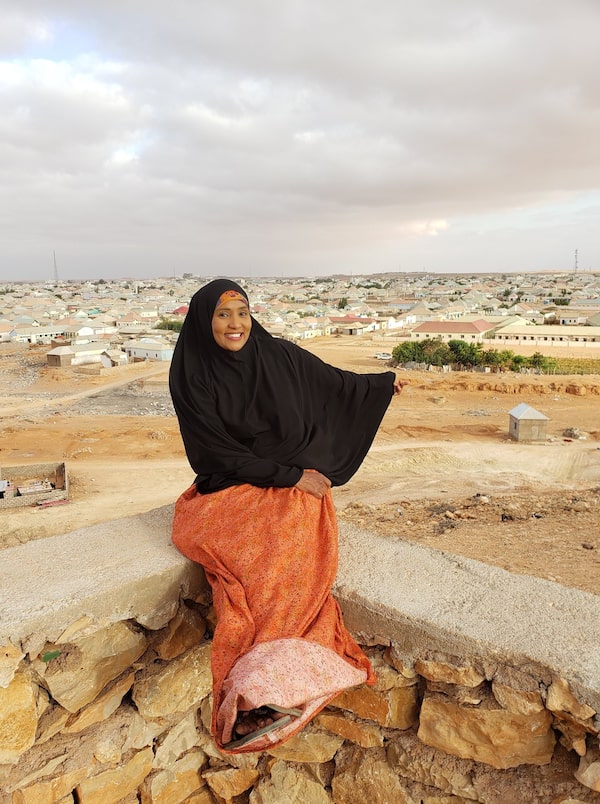
Hodan Nalayeh on a hill overlooking the city of Garoe, Somalia, in a recent handout photo published to social media.HO/The Canadian Press
Amira Elghawaby is a writer based in Ottawa
I had met Hodan Nalayeh on many occasions and was always struck by her brilliant smile, caring words and positive outlook.
Yet, like many other Canadians, it is only now, after her tragic death at the hands of violent extremists, that I have fully come to appreciate her immense contributions.
For the past several years, the Somali-Canadian journalist and broadcaster travelled between her home in Toronto and her homeland of Somalia.
Her stated objective: To provide uplifting narratives from the country her family, and countless others, had to flee due to war and conflict. Every report she shared was a challenge to the West’s “single story” about the African continent, one most synonymous with despair and tragedy.
“The single story creates stereotypes, and the problem with stereotypes is not that they aren’t true, but they are incomplete. They make one story become the only story,” Nigerian author Chimamanda Ngozi Adichie famously said in a 2013 Ted Talk.
Until just a few days ago, Ms. Nalayeh was achieving her goal of showcasing another side to Somalia that very few in the rest of the world ever saw. Through Integration TV, her hugely popular YouTube channel, Ms. Nalayeh had most recently uploaded stories from her stay in the port city of Kismayo, including of profiles of local women entrepreneurs.
In addition to her videos, she had also recently posted colourful, joyful images of local fishermen, overlooking the crystal blue waters of the Indian Ocean. Inspirational messages infused with her Muslim faith in both English and Somali were liked and shared by tens of thousands of people. She never wavered from expressing her many identities.
“We are inspiring millions of Somalis around the world to share their stories, to be authentic, to get to know themselves and where they come from, because all that we’ve known from our country is war. All that we’ve known from our country is division. All that we’ve known from our country is all the negative things,” she told an interviewer in 2017.
But even Ms. Nalayeh could not escape the harsh realities that continue to plague her country of birth. On Friday evening, terrorists attacked the hotel she had been staying in with her husband. They were both killed, along with 25 others. She was seven months pregnant.
While in life she was able to spotlight all she adored about Somalia, as well as highlight the immense contributions of Somali communities here in Canada, her death represents the very story she so desperately wanted to change.
That an act of terrorism would snatch her away from her family, and from communities that found renewed sense of pride in her narratives, has been hard to bear for many.
“Somalis around the world have lost a giant,” tweeted Mukhtar M. Ibrahim, editor and executive director of Sahan Journal, based in Minnesota, where news of her death was trending.
Many others added their condolences, including Canada’s Immigration Minister and former Somali refugee, Ahmed Hussen. “She became a voice for many,” he tweeted.
One of the most poignant reflections came from Somali writer and podcaster Idil Bilan who captured why Somalia’s stories must keep being told.
While reporting from the same seaside port, Ms. Bilan was once berated by a security official for trying to shake him off to explore the city on her own. When she began to cry, he said: "Idil, I’m sorry I yelled at you, but you're new to Kismayo, and I didn’t want you to die. Because we need you, and everyone else abroad here. I need you to be safe, so everyone back home knows it’s safe. And they come back, and I can stop carrying a weapon.
"I carried a weapon since 1991, and have fought for so many factions, I can’t keep count. I want the folks with the pens to return, so I can spend my days reading in the afternoon. I don't want to hold this weapon another day in my life. So stay alive, and help us fix this."
For those of us mourning the silencing of Ms. Nalayeh’s voice, we must commit to better listening to the next generation of voices following in her mighty footsteps. They, too, want to challenge the single story of their communities and help fix what’s broken.
Perhaps all that light will help overcome the dark, once and for all.